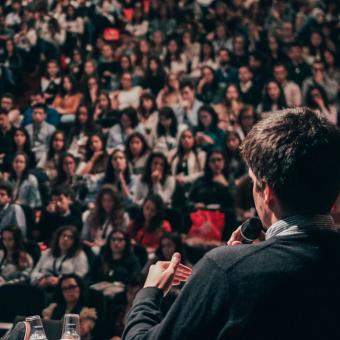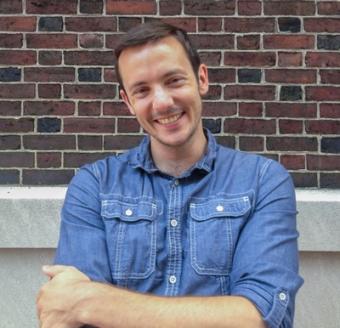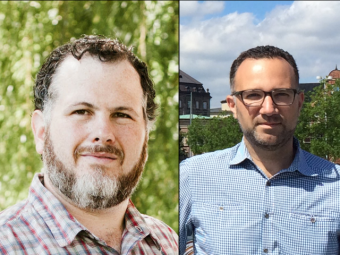This CMN Series is intended to provide researchers with an introduction to topics in multimodal neuroimaging. Talks are given by members of the representative Teams and Cores.
NIMH Workshop on Combined PET-MRI

PET and fMRI provide two separate and partially overlapping methods for neuroimaging. While PET relies on metabolic processing as measured by the dissipation of radioactive isotopes, MRI measures changes in blood oxygenation level (BOLD). Each method is useful for providing a quantitative metrics for brain function and dysfunction useful in the diagnosis and understanding of clinical brain disorders and normal development. The combination of methods adds values where the whole is greater than the sum of the parts.
Specific Aims
- Provide the NIMH community with a comprehensive overview of the latest developments, opportunities, and future directions in using combined PET-MRI for neuroimaging
- Invigorate discussion and use of PET-MRI neuroimaging within the NIH/NIMH communities as well as potential implications for clinical diagnoses and treatments
- Serve as a catalyst for collaborations between NIMH researchers and extramural experts studying using PET-MRI imaging to study clinical problems and advancing basic research knowledge.
The workshop will be divided into two sections: (1) Individual lectures showcasing the use of combined PET-MRI neuroimaging with a particular focus on either theoretical insights, or methodological advances; (2) An open panel of the future of PET-MRI neuroimaging and identifying the necessary steps or evolution of data collection, analysis, and interpretation for the future good of neuroscience research.
NIMH Workshop on Naturalistic Stimuli and Individual Differences

The Center for Multimodal Neuroimaging is thrilled to announce the upcoming workshop on Naturalistic Stimuli and Individual Differences with a range of extramural and intramural speakers presenting on their cutting-edge work. The workshop seeks to:
- bring together top scientists using naturalistic stimuli and/or the study of individual differences in neuroimaging;
- showcase theoretical, methodological, and analytical advances in these areas of research; and
- serve as a catalyst for collaborations between presenters, biomedical NIH researchers, and experts from around the world.
Speakers: Chris Baldassano, Janice Chen, Elizabeth DuPre, Emily S. Finn, Javier Gonzalez-Castillo, Uri Hasson, Jeremy Manning, Carolyn Parkinson, Elizabeth Redcay, Monica Rosenberg, Tamara Vanderwal, Gang Chen, Peter Molfese
Chris Baldassano - https://videocast.nih.gov/watch=42538&start=133
Elizabeth DuPre - https://videocast.nih.gov/watch=42538&start=2831
Janice Chen - https://videocast.nih.gov/watch=42538&start=5927
Gang Chen - https://videocast.nih.gov/watch=42538&start=7450
Emily S Finn - https://videocast.nih.gov/watch=42538&start=10164
Javier Gonzalez-Castillo - https://videocast.nih.gov/watch=42538&start=13214
Jeremey Manning - https://videocast.nih.gov/watch=42538&start=16766
Carolyn Parkinson - https://videocast.nih.gov/watch=42538&start=18368
Elizabeth Redcay - https://videocast.nih.gov/watch=42538&start=20638
Monica Rosenberg - https://videocast.nih.gov/watch=42538&start=23549
Tammy Vanderwal - https://videocast.nih.gov/watch=42538&start=26564
Uri Hasson - https://videocast.nih.gov/watch=42538&start=29491
For more information go to https://cmn.nimh.nih.gov/cmnworkshop2021
Open Science

There is a rising chorus of calls for science to become more reliable, replicable, and reproducible. Many of these demands focus on increasing statistical power by collecting larger sample sizes. However, science is not a heterogenous pursuit, and larger sample sizes may not make sense for many types of research problems. In this talk, I describe why improved statistical power solves many research problems, and what other tools are available to you when a larger sample size does not make sense.
Introduction to Simultaneous EEG-fMRI at NIMH

The Center for Multimodal Neuroimaging (CMN; https://cmn.nimh.nih.gov/) hosted a presentation on “Introduction to Simultaneous EEG-fMRI” on June 3rd in Building 40 Room 1201/1203 at 10AM. The presentation focused on the basics of EEG-fMRI and resources available at NIMH covering 1) equipment setup, 2) data acquisition, 3) data analysis.
Benefits of Multi-Echo fMRI

Members of the Section of Functional Imaging Methods (SFIM) and FMRI Facility (FMRIF) presented on the “Advantages of Multi-echo fMRI”. The presentation is geared to individuals new to multi-echo fMRI and covers: 1) conceptual introduction of multi-echo fMRI and its advantages; 2) denoising fMRI data using postprocessing of multi-echo fMRI in AFNI; and 3) How to add multi-echo fMRI to your paradigms on GE and Siemens scanners.